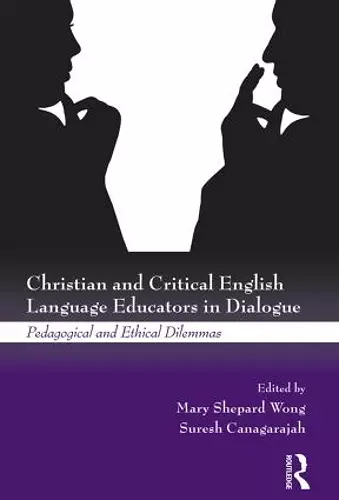Christian and Critical English Language Educators in Dialogue
Pedagogical and Ethical Dilemmas
Suresh Canagarajah editor Mary Shepard Wong editor
Format:Paperback
Publisher:Taylor & Francis Ltd
Published:10th Jun '11
Currently unavailable, and unfortunately no date known when it will be back
This paperback is available in another edition too:
- Hardback£160.00(9780415999533)

The legacy of English teaching and Christian missionaries is a flashpoint within the field of English language teaching. This critical examination of the place of Christianity in the field is unique in presenting the voices of TESOL professionals from a wide range of religious and spiritual perspectives. About half identify themselves as "Christian" while the others identify themselves as Buddhist, atheist, spiritualist, and variations of these and other faiths.
What is common for all the authors is their belief that values have an important place in the classroom. What they disagree on is whether and how spiritual values should find expression in learning and teaching. This volume dramatizes how scholars in the profession wrestle with ideological, pedagogical, and spiritual dilemmas as they seek to understand the place of faith in education. To sustain this conversation, the book is structured dialogically.
Each section includes a set of position chapters in which authors explain their views of faith/pedagogy integration, a set of chapters by authors responding to these positions while articulating their own views on the subject, and discussion questions to engage readers in comparing the positions of all the authors, reflecting on their own experiences and values, and advancing the dialogue in fresh and personal directions.
"Remember, never talk about politics or religion." This well-meaning advice to keep peace among those who are likely to disagree is thankfully ignored in this daring foray into a minefield of conflicting opinions. The book examines an emotionally explosive controversy in ELT: Should evangelical Christians use their teaching role as a way to evangelize? The book does not stop with the initial question but recasts the controversy to define a new area of scholarship regarding the impact of spiritual values on ELT teaching. Using articles written by evangelical ELT teachers and Critical practitioners, the book opens a valuable dialogue on both the importance of spiritual values in teaching and the danger of mixing religious beliefs with political goals. For evangelical ELT teachers, the book is an essential part of their professional training. It includes sympathetic writers who raise important issues as well as writers who are not sympathetic yet ask questions that can’t be ignored. For non-evangelical teachers, the book is equally important in the way that it focuses on the central role of the teachers’ faith and values in the classroom. The book raises more questions than it answers, but it is for this reason that it is so valuable.
As a teacher trainer who has worked with many evangelical ELT teachers, I have sympathy for them, but little sympathy for some of the practices for which they are criticized in this book. I also respect the critics and their work, and appreciate their shining a light on unsavory practices, but some of their criticisms seem to reveal the self-righteousness they so rightly condemn in others. I suspect that there are many TESOL educators like me who are very interested in the religious issues raised in this volume. We take our faith seriously, we largely respect the faith traditions of others not like us, and we take seriously our vocation as teachers and the opportunity teaching gives to make an impact on the world. This book will offer a forum to confront these questions in our teacher training programs, where the role of our values (religious and otherwise) should be discussed openly.
John Levis, Associate Professor, TESL/Applied Linguistics, Iowa State University
At first blush, Christianity, Critical Pedagogy, and English Language
Teaching seem to make unlikely bedfellows, but in this post-modern era where the relationship between religion and politics captures public
attention, this anthology is a timely and welcome volume. The some
thirty authors comprise a remarkable group of well-known language
scholars, applied linguists, and experienced language teachers who
argue for very different perspectives about the role of "Christians"
in the teaching of English as a global language. Despite the incisive
opinions that are expressed, I am impressed with the authors'
appreciation of opposing viewpoints. In this age when talking at
captures more attention than talking to, I applaud this collection of
diverse and thought-provoking dialogues on what represents the heart
of our teaching.
Thomas Scovel, San Francisco State University
"Christian and Critical English Language Educators in Dialogue is an ambitious and effective book, bringing together well-known figures and some who are newer to the field to address topics about which they are passionate. This is a laudable, major accomplishment."--Christian Scholar's Review
"This book is an excellent resource for theorists and practitioners who wish to develop useful, appropriate ways of bringing mindfulness of religious/spiritual perspectives into an ever more inclusive professional discourse, as well as for those who think the whole thing is a terrible idea. All can benefit."--TESOL Quarterly
ISBN: 9780415504676
Dimensions: unknown
Weight: 610g
326 pages